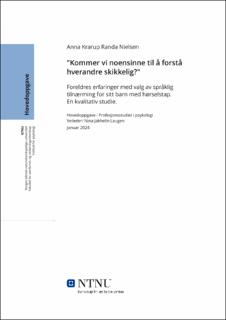| dc.contributor.advisor | Laugen, Nina Jakhelln | |
| dc.contributor.author | Nielsen, Anna Krarup Randa | |
| dc.date.accessioned | 2024-04-24T17:19:33Z | |
| dc.date.available | 2024-04-24T17:19:33Z | |
| dc.date.issued | 2024 | |
| dc.identifier | no.ntnu:inspera:155555788:36885402 | |
| dc.identifier.uri | https://hdl.handle.net/11250/3128003 | |
| dc.description.abstract | Bakgrunn: Hørselstap kan ha store konsekvenser for psykisk helse, sosial fungering og kommunikasjon. Gode tiltak til rett tid må iverksettes for å foregripe disse konsekvensene. Når barn med hørselstap blir født, står foreldre med et stort, usikkert valg. Skal de fokusere på å kun utvikle talespråk for barnet, eller skal de i tillegg bruke tegnspråk? Det er begrenset kunnskap om hvilket valg som er best for hvilke barn.
Hensikt: Formålet med hovedoppgaven er å utforske hovedproblemstillingen: hvordan opplever foreldre prosessen der de skal velge språktilnærming for sitt barn med hørselstap? Dette inkluderer å undersøke forskningsspørsmål som omhandler hvilke faktorer som påvirker foreldrenes valg, samt å identifisere hva slags informasjon foreldre opplever som mangelfull i beslutningsprosessen.
Metode: Det ble gjennomført ti semistrukturerte intervju med elleve foreldre av barn i alderen 20 måneder til 14 år, med et identifisert hørselstap. Datamaterialet ble analysert ved hjelp av tematisk analyse.
Resultater: Fem overordnede temaer ble identifisert i analysen, med tilhørende undertemaer. Fire temaer identifiserer faktorer som påvirker foreldrenes beslutning knyttet til språk, nemlig (1) usikkerhet, (2) barnets fungering, (3) språkmiljø og (4) informasjon fra andre. Det siste temaet berører oppgavens hovedproblemstilling (5) valget oppleves som en kontinuerlig prosess.
Konklusjon: Foreldres opplevelse av å ta et valg knyttet til språktilnærming for sitt barn påvirkes av en rekke faktorer, og foreslås å avhenge av beslutningskonteksten, beslutningstakeren og ekstern påvirkning. Spesielt er disse faktorene relatert til hvordan informasjon legges frem for foreldrene, som opplever å stå alene med et stort og usikkert valg. Samvalg foreslås som en tilnærming for å øke informasjon og støtte til foreldre i en krevende prosess. Slik kan man ivareta både barnets språkutvikling og foreldrenes opplevelse av å gi barnet de beste forutsetningene for å mestre livet. | |
| dc.description.abstract | Background: Hearing loss is shown to potentially have consequences for mental health, social functioning and communication. Good measures must be implemented at the right time to anticipate these consequences. When children with hearing loss are born, parents are faced with a big, uncertain choice. Should they focus on only developing spoken language for the child, or should they also use sign language? There is limited knowledge about which choice is best for which children.
Purpose: The purpose of the thesis is to explore the main research question: how do parents experience the process of choosing a language approach for their child with a hearing loss? This includes investigating research questions regarding which factors influence parents' choices, as well as identifying what kind of information parents perceive as lacking in the decision-making process.
Method: Ten semi-structured interviews were conducted with eleven parents of children aged 20 months to 14 years, with an identified hearing loss. The data material was analyzed using thematic analysis.
Results: Five overarching themes were identified in the analysis, with associated subthemes. Four themes identify factors that influence the parents' decision related to language, namely (1) uncertainty, (2) the child's functioning, (3) language environment and (4) information from others. The last theme touches on the thesis' main research question (5) the choice is experienced as a continuous process.
Conclusion: Parents' experience of making a choice regarding the language approach for their child is influenced by a number of factors, and is suggested to depend on the decision context, the decision maker and external influences. In particular, these factors are related to how information is presented to the parents, who experience being alone with a large and uncertain choice. Shared decision-making is proposed as an approach to increase information and support for parents in a demanding process. Thus, one can support both the child's language development and the parents' experience of giving the child the best conditions to cope with life. | |
| dc.language | nob | |
| dc.publisher | NTNU | |
| dc.title | "Kommer vi noensinne til å forstå hverandre skikkelig?"
Foreldres erfaringer med valg av språklig tilnærming for sitt barn med hørselstap.
En kvalitativ studie. | |
| dc.type | Master thesis | |
